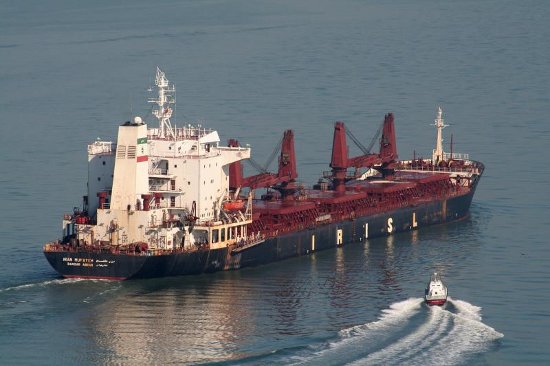|
|
|
The IRSIL Mufateh. |
The New York Times ran a front page story yesterday about the effectiveness of the Revolutionary Guard’s shell corporations created for the state-owned Islamic Republic of Iran Shipping Lines (IRSIL).
The article explains that 73 of the 123 known IRSIL vessels are owned and operated by foreign companies not listed the on the blacklist of the US Treasury Department’s Office of Foreign Assets Control (OFAC). In order to obtain illegal cargo — like a 51-foot Bladerunner speedboat useful for conversion into a fast-attack craft — IRSIL creates a daisy-chain of shell corporations running foreign flags to protect the ships.
Jo Becker explains why this form of legal gymnastics by IRSIL is placing a major hurdle in the way of a new regimen of UN-backed sanctions:
Irisl’s maneuvering may help it with a continuing problem. Britain, home to some of the world’s largest shipping insurers, placed its own sanctions on Irisl last fall. As a result, policies were canceled for many Irisl-owned ships. But the British sanctions, as well as a subsequent ban enacted by the ship insurance center of Bermuda, only cover Irisl, not subsidiaries or related entities. And records show that British and Bermudan companies still insure at least 10 ships owned by Irisl subsidiaries that are on the American blacklist… As difficult as it is to keep track of ships that are on the blacklist, ships that have never been listed present an even greater challenge. Irisl has taken great care to hide its connections to vessels that have been launched since the blacklist was issued.
Early this year, for instance, five corporate transactions were recorded in Malta in which the ownership of five ships changed hands. All the ships – the Baani, Haami, Shaadi, Aali and Baaghi – had been completed and inspected in either 2009 or 2010, with a building price of $29 million apiece, according to IHS Fairplay. In each case, IHS Fairplay records show that the vessels came out of the shipyards and into the ownership hands of Maltese shipping companies named Petsworth, Quinns, Reigate, Oxted and New Haven. Still, buried deep within Maltese corporate records was the fact that Irisl owned the stock in those companies. In the five simultaneous transactions on Jan. 26, Irisl attempted to sever even that link, transferring its shares in each company to three Iranians. It turns out, though, that two of those Iranians, who together, records show, now own the majority of stock, are Irisl officials.
The records also offer an additional detail that raises questions about whether these were truly arm’s-length transactions: In each case, the price per share was 2.33 euros, or $3.28 at the time, meaning that Irisl effectively sold companies that owned ships with a combined value of $145 million for a total of $8,200.
Are you a dedicated reader of FDD's Long War Journal? Has our research benefitted you or your team over the years? Support our independent reporting and analysis today by considering a one-time or monthly donation. Thanks for reading! You can make a tax-deductible donation here.









4 Comments
Just Nuke Em. Nukes end wars we better be first eh?
So, I take it you are about..13, 14 years old?
I’ve got a better idea. Let’s not nuke them. And let’s think for about three seconds before we post something on the internet.
Sad part is “losing it” may have a point. Although I may not agree with the “Nuke ’em”. However, lets see Iran is training and supporting terrorist, is run by Islamist extremists, want nothing more than to eliminate the US, Isreal, and Europe, and they are soon to have nuclear weapons. Iran would not care what the world thinks if they nuked the US or Israel. I think it may be time to head to the main nest of this evil.
Why, in this day of GPS and satellite surveillance, is it so hard to track these vessels? Scuttling a few of these vessels through sabotage or a well-timed torpedo will make the Iranians think twice about the cost of their doing business. As always, follow the money; especially in places like Dubai and the Gulf states which help launder Iranian revolutionary guard monies.